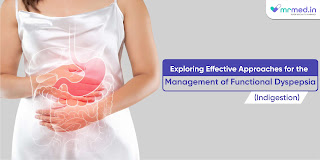Exploring Effective Approaches for the Management of Functional Dyspepsia (Indigestion)

Functional dyspepsia (indigestion) is when the individual has recurrent symptoms of an upset stomach without an exact cause. It is also known as nonnuclear dyspepsia, which is a chronic digestive disorder common in people all over the world. Functional dyspepsia needs a multifaceted approach to manage the symptoms in the patients. Today, we are going to discuss the management strategies for functional dyspepsia.
Types of Functional dyspepsia
Functional dyspepsia can classified into two types, which are given below:
Epigastric pain syndrome (EPS), symptoms associated with upper abdominal pain and burning.
Postprandial distress syndrome (PDS), symptoms that occur after eating (early fullness, bloating, and nausea).
Symptoms of functional dyspepsia
Functional dyspepsia can be identified by the following symptoms which are given below:
Epigastric pain: Individuals may have upper abdomen pain during functional dyspepsia.
Bloated stomach: Patients may feel discomfort, pressure, or fullness in the stomach.
Loss of appetite: Individuals may experience a feeling of fullness after or during eating.
Heartburn: Patients may have a burning sensation between the stomach and esophagus.
Acid reflux: Individuals may experience stomach acid rising in the food pipe.
Nausea or vomiting: Due to acid reflux, patients often experience nausea or vomiting.
Management of functional dyspepsia
Functional dyspepsia can be managed using several strategies to help you manage the symptoms and improve overall health. Here are some of the management strategies given:
Lifestyle Modifications:
It is recommended to encourage the patients to adopt some lifestyle changes like getting proper sleep, leading a stress-free life, reducing alcohol, and quitting smoking to alleviate the FD-related symptoms in patients.
Dietary Changes: To manage functional dyspepsia symptoms, it is advised to maintain a balanced diet, eat small and more frequent meals, and reduce caffeine consumption. Avoid spicy or fatty foods, which trigger the symptoms.
Stress Management: Regular stress management activities like mindfulness, relaxation exercises, and yoga can help reduce stress, which can alleviate digestive problems.
Medications:
Reducing intestinal gas: Medicines like simethicone can help relieve intestinal gas caused by bloating during functional dyspepsia.
H-2-receptor blockers: Medicines like H-2 receptor blockers reduce gastric acid secretion by blocking the H-2 receptor in the stomach.
Proton pump inhibitors: PPIs are drugs that help block the enzyme H+/K+ ATPase or proton pump, which is involved in acid production in the stomach. Thereby, it is used to treat functional dyspepsia in patients.
Antibiotics: Antibiotics are medicines that help treat H. pylori-related functional dyspepsia in patients.
Low-dose antidepressants: Your doctor can provide low-dose antidepressant drugs like tricyclic antidepressants (TCAs), which help to inhibit the SSR (selective serotonin reuptake) involved in the intestinal pain of the FD.
Prokinetics: It is a type of gastroprokinetic medication that helps to improve the condition of the stomach in FD patients. Prokinetic-like Acogut 100mg Tablet works by increasing the release of acetylcholine, a neurotransmitter that stimulates the muscles of the gastrointestinal tract. This enhanced release of acetylcholine can help improve gastric emptying and reduce symptoms associated with functional dyspepsia, such as bloating and discomfort.
Antiemetics:
Medicines like antiemetics drugs can help to relieve nausea or vomiting symptoms caused by functional dyspepsia in patients.
Herbal Remedies and Supplements: Herbs and supplements like peppermint oil, ginger, and chamomile effectively relieve the functional dyspepsia symptoms in patients. Discuss your healthcare provider for further details.
Acupuncture:
It is a special technique that was used by professionals to relieve and enhance the symptoms of functional dyspepsia in patients with the help of fine needles inserted into the skin. It will help to increase the preprandial gastrin level and improve the gastric motility of the individuals.
Regular Follow-up and Monitoring:
Patients are recommended to do regular follow-ups with their doctor, which will help them monitor the progressions and make the necessary adjustments to the treatment plan.
Functional dyspepsia is a condition in which patients need a tailored plan to treat and manage the symptoms caused by the disorder. Always consult your doctor if you have any discomfort or symptoms related to functional dyspepsia.


Comments
Post a Comment